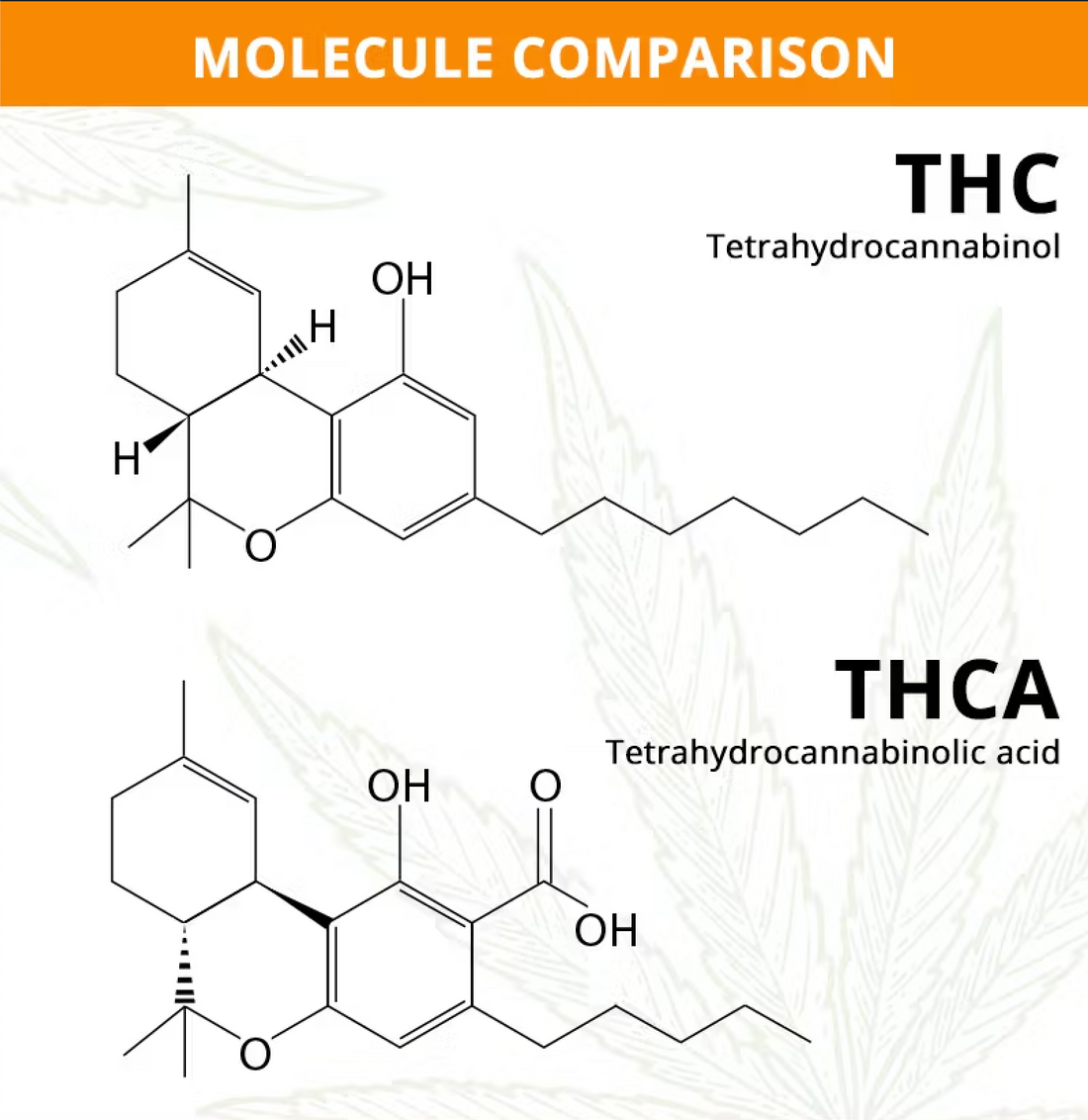
THC vs. THCA: Navigating the Depths of Cannabis Potency
Unlocking the Power of THCa: A Dive into Potency and Understanding THC
Welcome to another insightful journey into the world of cannabis. Today, we'll be exploring the fascinating realm of THCa, its transformation into THC, and the nuanced differences that define their potency.
THCa vs. THC: The Basics
THCa, or Tetrahydrocannabinolic Acid, is the raw, non-intoxicating form of THC found in the cannabis plant. Through a process called decarboxylation—often triggered by heat—THCa transforms into THC, the well-known psychoactive compound responsible for the "high" associated with cannabis consumption.
Effects of THC: Unleashing the High
THC's interaction with the body's endocannabinoid system leads to a cascade of effects, including:
- Euphoria: THC induces a sense of happiness and elation.
- Relaxation: Many users experience a calming effect, aiding stress relief.
- Increased Creativity: Some find heightened creative thinking and inspiration.
- Altered Perception: THC can influence sensory perception, intensifying experiences.
Effects of THCA: The Untapped Potential
In its raw form, THCA doesn't induce a traditional high. Instead, potential benefits may include:
- Anti-Inflammatory Properties: THCA shows promise as an anti-inflammatory agent, potentially aiding conditions like arthritis.
- Neuroprotective Qualities: Research suggests THCA may have neuroprotective effects, benefiting neurological conditions.
- Antiemetic Effects: THCA could help alleviate nausea and vomiting, making it valuable for patients undergoing treatments like chemotherapy.
Dosing Considerations for THC and THCA
-
THC Dosing:
- Start Low, Go Slow: Begin with a lower THC dose and gradually increase to find your optimal level.
- Method Matters: Effects vary based on consumption method (smoking, vaping, edibles), influencing onset time and duration.
-
THCA Intake:
- Raw Cannabis Consumption: Eating or juicing raw cannabis provides THCA without the psychoactive effects.
- Potential Therapeutic Doses: If exploring THCA for potential therapeutic benefits, consult with a healthcare professional.
Potency Unveiled: The Power of THCa
One of the key aspects that make THCa noteworthy is its potential potency. Unlike THC, THCa doesn't induce the typical euphoric effects. Instead, it offers a range of potential therapeutic benefits without the psychotropic experiences commonly associated with THC.
Research suggests that THCa possesses anti-inflammatory, neuroprotective, and antiemetic properties. This means it may have applications in managing conditions such as chronic pain, inflammation, and nausea without the high typically associated with THC.
The Decarboxylation Process: Unleashing THC's Potential
When you apply heat to cannabis—whether through smoking, vaping, or cooking—the decarboxylation process occurs, converting THCa into THC. This activation step is crucial for unlocking the full potential of cannabis. Understanding this process empowers users to control the level of THC in their cannabis products, allowing for a personalized and controlled experience.
Navigating the Differences: THCa vs. THC
While both THCa and THC originate from the same precursor, their chemical structures and effects differ. THCa is renowned for its crystalline structure, often seen in the form of kief or crystals on cannabis buds. On the other hand, THC is responsible for the intoxicating effects sought after by recreational users.
Potency Matters: Harnessing the Benefits
The varying effects of THCa and THC underscore the importance of potency considerations when selecting cannabis products. For users seeking therapeutic benefits without the high, high-THCa strains or products might be preferable. On the contrary, those desiring the classic cannabis experience would opt for higher THC concentrations.
In Conclusion: The Dynamic Duo of THCa and THC
As we conclude our exploration, it's evident that THCa and THC form a dynamic duo within the cannabis plant, offering a spectrum of effects catering to diverse user preferences. Whether you're a medical cannabis patient looking for relief or a recreational user seeking an elevated experience, understanding the potency and differences between THCa and THC empowers you to make informed choices.
Remember, each cannabis strain and product is unique, presenting its own balance of cannabinoids. By embracing this knowledge, you embark on a journey of discovery, unlocking the full potential of cannabis and harnessing its therapeutic and recreational benefits.
Stay tuned for more enlightening journeys into the ever-evolving world of cannabis. Until next time, happy exploring!
